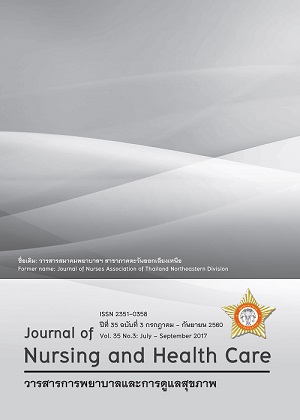สภาวะสุขภาพและคุณภาพชีวิตของผู้สูงอายุ ภายใต้การดูแลของเครือข่ายชุมชนร่วมกับครอบครัวเสมือน Elder’s Health Status and Quality of Life under the Health Care Provided by Community Network and Simulated Families
คำสำคัญ:
เครือข่ายชุมชน คุณภาพชีวิต สูงอายุ ครอบครัวเสมือน community network, Quality of life, Elder, simulated familyบทคัดย่อ
บทคัดย่อ
การวิจัยประเมินผลครั้งนี้ มีวัตถุประสงค์เพื่อศึกษาสภาวะสุขภาพและคุณภาพชีวิตของผู้สูงอายุภายใต้การดูแลของเครือข่ายชุมชนร่วมกับครอบครัวเสมือนในชุมชนตำบลธงชัย จังหวัดเพชรบุรี มีวัตถุประสงค์เฉพาะเพื่อศึกษาพฤติกรรมสุขภาพและปัจจัยที่เกี่ยวข้องกับคุณภาพชีวิตของผู้สูงอายุที่มีโรคเรื้อรัง ติดเตียง พึ่งพิงและอยู่ลำพังและเพื่อเปรียบเทียบระดับคุณภาพชีวิตของผู้สูงอายุที่มีโรคเรื้อรัง ติดเตียง พึ่งพิงและอยู่ลำพังระหว่างก่อนและหลังได้รับการดูแลโดยเครือข่ายชุมชนร่วมกับนักศึกษาพยาบาลครอบครัวเสมือนโดยกระบวนการเยี่ยมบ้านตามหลักเวชศาสตร์ครอบครัวและการดูแลแบบองค์รวมเป็นระยะเวลา 6 เดือนคัดเลือกกลุ่มตัวอย่างแบบเจาะจงตามเกณฑ์ที่กำหนด ประกอบด้วย ผู้สูงอายุ 44 คน ตัวแทนญาติหรือผู้ดูแล 10 คนและนักศึกษาพยาบาลในครอบครัวเสมือน 22 คน เครื่องมือวิจัยประกอบด้วยแบบประเมินสภาวะสุขภาพพฤติกรรมสุขภาพและปัจจัยที่เกี่ยวข้องกับคุณภาพชีวิตของผู้สูงอายุ ซึ่งดัดแปลงจากแบบประเมินการเยี่ยมบ้าน(INHOMESSS)ของ อันวินและเจเรนท์ แบบสัมภาษณ์คุณภาพชีวิตผู้สูงอายุซึ่งดัดแปลงจากองค์การอนามัยโลก (WHOQOL-BREF)และแบบสัมภาษณ์กึ่งโครงสร้างสำหรับสัมภาษณ์นักศึกษาพยาบาลครอบครัวเสมือนและผู้ดูแลผู้สูงอายุ ข้อมูลเชิงปริมาณวิเคราะห์โดยสถิติบรรยาย และWilcoxon Rank Sum W test ข้อมูลเชิงคุณภาพใช้การวิเคราะห์เนื้อหา(Content analysis)
ผลการวิจัยพบว่า ผู้สูงอายุส่วนใหญ่ ร้อยละ 63.6 ช่วยเหลือตนเองในการดำเนินชีวิตประจำวันได้ แม้ว่าร้อยละ 86.4 จะมีโรคเรื้อรัง เช่น โรคความดันโลหิตสูง โรคเบาหวานและโรคหัวใจ มีการรักษาไม่ต่อเนื่อง ขาดการออกกำลังกายและไม่เข้าร่วมกิจกรรมทางสังคม ร้อยละ 56.8, 59.1 และ 88.6 ตามลำดับ หลังได้รับการดูแลจากเครือข่ายชุมชนร่วมกับครอบครัวเสมือนผู้สูงอายุมีระดับคุณภาพชีวิตโดยรวมดีขึ้น (=3.43,SD=0.42) กว่าก่อนได้รับการดูแล(=3.26,SD=0.38) อย่างมีนัยสำคัญทางสถิติที่ระดับ .01ทั้งด้านร่างกาย จิตใจและความสัมพันธ์ทางสังคม ยกเว้นด้านสิ่งแวดล้อมที่ไม่แตกต่าง บทเรียนที่ได้รับพบว่าการเยี่ยมบ้านสามารถส่งเสริมการดูแลแบบองค์รวมด้วยหัวใจความเป็นมนุษย์แก่ผู้สูงอายุทั้งตามสภาพปัจจุบันและเชิงรุกนักศึกษาพยาบาลได้รับประสบการณ์การดูแลผู้สูงอายุตามสภาพจริง ญาติหรือผู้ดูแลมีโอกาสรับรู้สภาวะสุขภาพของผู้สูงอายุและความรู้ในการดูแลตามสภาพสมาชิกของเครือข่ายที่ทำงานด้วยกันตั้งแต่เริ่มต้นได้เกิดการพัฒนาศักยภาพเกิดความเข้าใจและมองเห็นปัญหาที่จะต้องให้การช่วยเหลือผู้สูงอายุอย่างต่อเนื่องต่อไป
การศึกษานี้จึงสามารถเป็นต้นแบบในการจัดบริการแบบองค์รวมที่ตรงตามบริบทชีวิตจริงของผู้สูงอายุโดยเครือข่ายชุมชนร่วมกับสถาบันการศึกษาด้านสุขภาพเพื่อร่วมให้บริการและการปฏิบัติตามบทบาทของตนที่เหมาะสม
Abstract
The objectives of this evaluative study were to study a quality of life of the elder with chronic diseases and dependently staying, bedridden or living alone in Thongchai Sub-District of Phetchburi Province and to compare the quality of life in the elder with chronic diseases and dependently staying, bedridden or living alone between before and after they got care provided by the community network and simulated family’s nursing students. The quantitative and qualitative data collected from 3 purposive participant groups; 44 elderly and representatively 10 relatives or caregivers including 22 nursing students which by a home visit recording-form and semi-structure questionnaire of the elder’s quality of life were analyzed by descriptive statistic, Wilcox-son Rank Sum W test and by content analysis, consequently.
The research results revealed that most elderly, 63.60 percent could help themselves in everyday activities though 86.36 percent had hypertension, diabetes and heart disease. They got continual care irregularly but lacked of usually physical exercise and accompanied in the community club; 56.82, 59.09 and 88.64 percent consequently. Their quality of life before (=3.26,SD=0.38) and post (=3.43,SD=0.42) engaging the project was statistically significantly different at .01 levels in physical, mental and social relationship excepting the environment aspect. The lessons learned were that the home visit done mainly by the nursing students together the health volunteers under the support by the community network could promote a humanized holistic care in advance or in present stage suitably to the elder life context and in all aspects. The nursing students got experiences in providing a nursing care just in a real life. The all relevant parties working closely together from start through the end could enhance themselves the potential in further giving care for the elderly in the community.
This study could be the model in providing care for the elder by the community network together with the health care educational institutes to provide a holistic care on a real life and to perform their roles properly as well.


